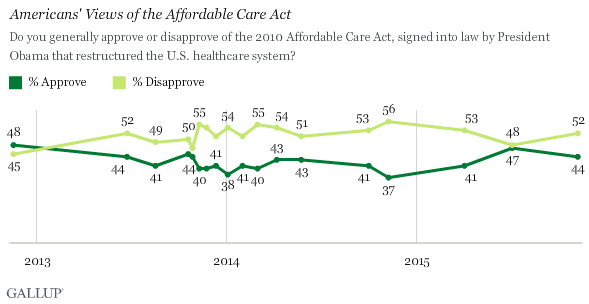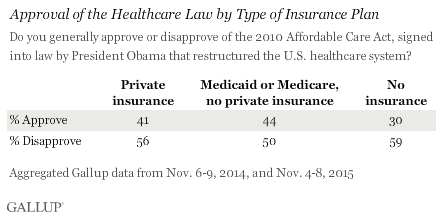The latest numbers from Gallup confirm that more than five years after its party-line passage, and two years after its full implementation, a majority of Americans continue to oppose Democrats' expensive, disruptive healthcare power grab:

The trend line shows that opposition to Obamacare has consistently outpaced support for the last two years (the last six, really), with a single data point showing a virtual tie several months ago, before the spread opened back up. Even as the media focus on the law's failures has grown less intense, bad headlines and bad outcomes persist. On the latter score, I'll direct your attention to Cortney's post from last night, which quotes a New York Times piece chronicling the plight of many Americans who are discovering that the costly coverage mandated in the inaptly-named "Affordable" Care Act is out of their price range:
Obama administration officials, urging people to sign up for health insurance under the Affordable Care Act, have trumpeted the low premiums available on the law’s new marketplaces. But for many consumers, the sticker shock is coming not on the front end, when they purchase the plans, but on the back end when they get sick: sky-high deductibles that are leaving some newly insured feeling nearly as vulnerable as they were before they had coverage. “The deductible, $3,000 a year, makes it impossible to actually go to the doctor,” said David R. Reines, 60, of Jefferson Township, N.J., a former hardware salesman with chronic knee pain. “We have insurance, but can’t afford to use it.” In many states, more than half the plans offered for sale through HealthCare.gov, the federal online marketplace, have a deductible of $3,000 or more, a New York Times review has found...“We could not afford the deductible,” said Kevin Fanning, 59, who lives in North Texas, near Wichita Falls. “Basically I was paying for insurance I could not afford to use.” He dropped his policy...in interviews, a number of consumers made it clear that premiums were only one side of the affordability equation. “Our deductible is so high, we practically pay for all of our medical expenses out of pocket,” said Wendy Kaplan, 50, of Evanston, Ill. “So our policy is really there for emergencies only, and basic wellness appointments.” Her family of four pays premiums of $1,200 a month for coverage with an annual deductible of $12,700. In Miami, the median deductible, according to HealthCare.gov, is $5,000. (Half of the plans are above the median, and half below it.) In Jackson, Miss., the comparable figure is $5,500. In Chicago, the median deductible is $3,400. In Phoenix, it is $4,000; in Houston and Des Moines, $3,000.
This is just the latest in a string of stories outlining how "sticker shock" is pounding Obamacare's enrollees, with out-of-pocket expenses rising within both the individual and employer-based markets. The Times piece frames monthly premiums are a relative selling point on Obamacare's affordability scale, but that's not exactly true. As we've thoroughly documented, rates are climbing higher across the country, with many consumers experiencing double-digit increases. Experts warn that this trend could accelerate even further next year when the law's bailout-style provisions to help offset insurers' losses expire. The story also quotes administration officials claiming high levels of satisfaction among Obamacare exchange consumers. While it's true that some people have been assisted by the law, more have been hurt by it, and the administration's own diminished enrollment projections belie their upbeat spin. One of the largest contributing factors to the far lower-than-expected enrollment numbers is the assessment among legions of uninsured Americans that they simply cannot afford to comply with the law -- which levies a tax as punishment for noncompliance. Back to the Gallup poll:

All three groups polled disapprove of the law, with the approve/disapprove split being closest among Medicaid and Medicare recipients. The gap is 15 points among those on the employer-provided market, as many are still experiencing higher rates and out-of-pocket costs, while worrying that they may be the next group betrayed by the president's "keep your plan" lie. Finally, we have the uninsured, who oppose Obamacare by nearly 30 points. Democrats shoved a $2 trillion law down America's collective throat, and the people it was designed to help the most detest it, largely because it utterly fails to fulfill its central pledge to them. I'll leave you, as I so often do, with this. Words have meaning, expectations are important, and promises matter:
